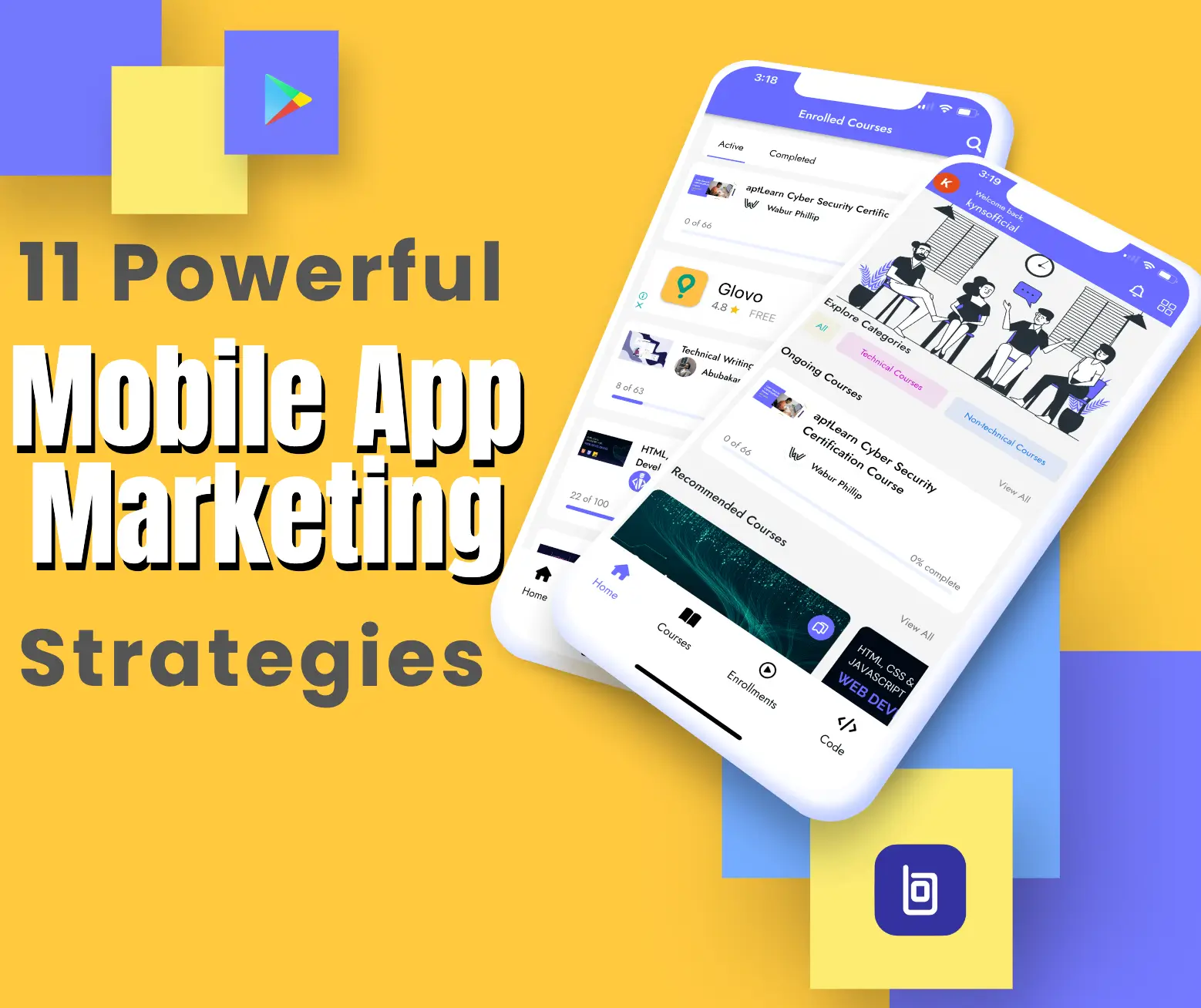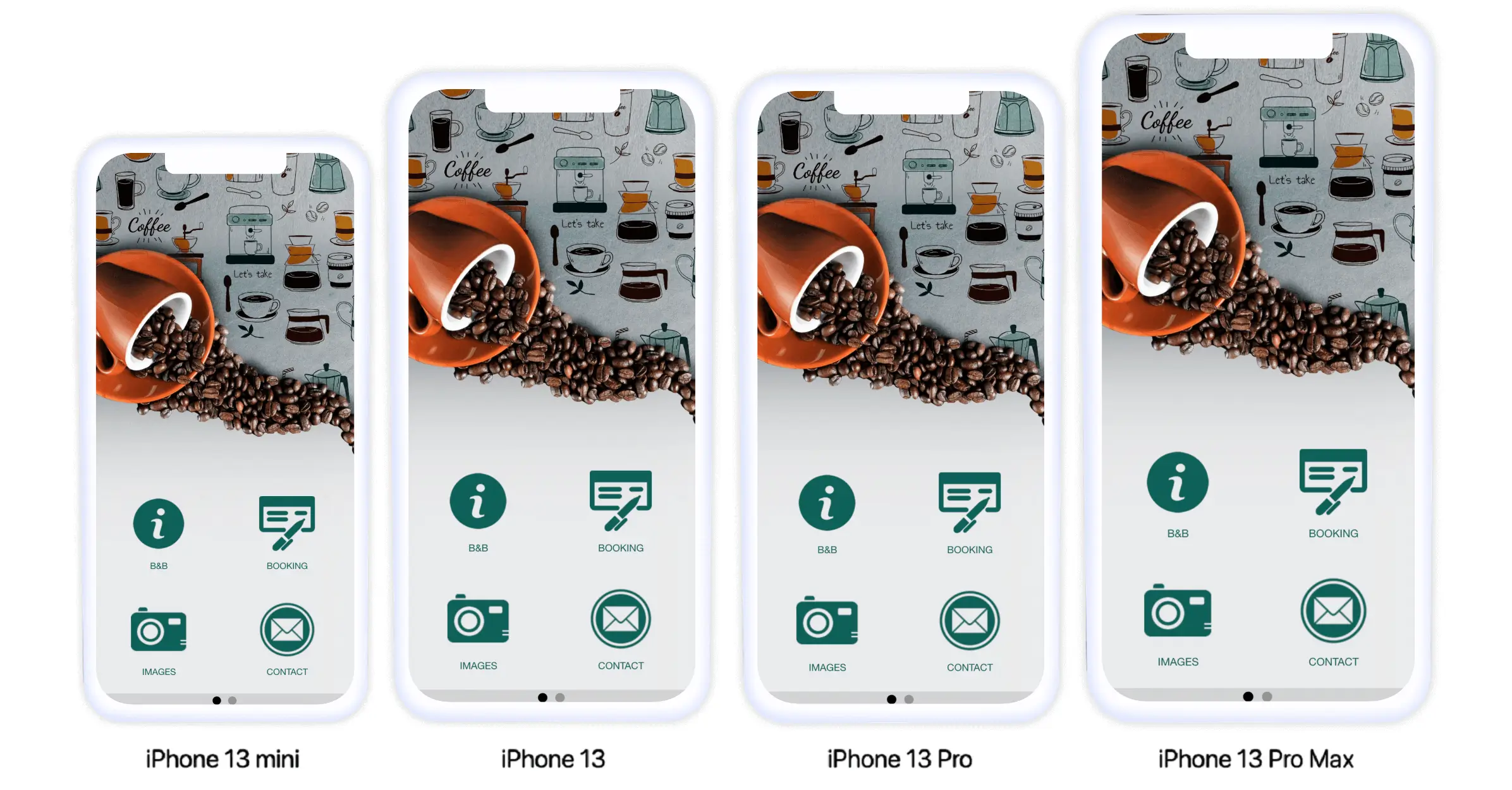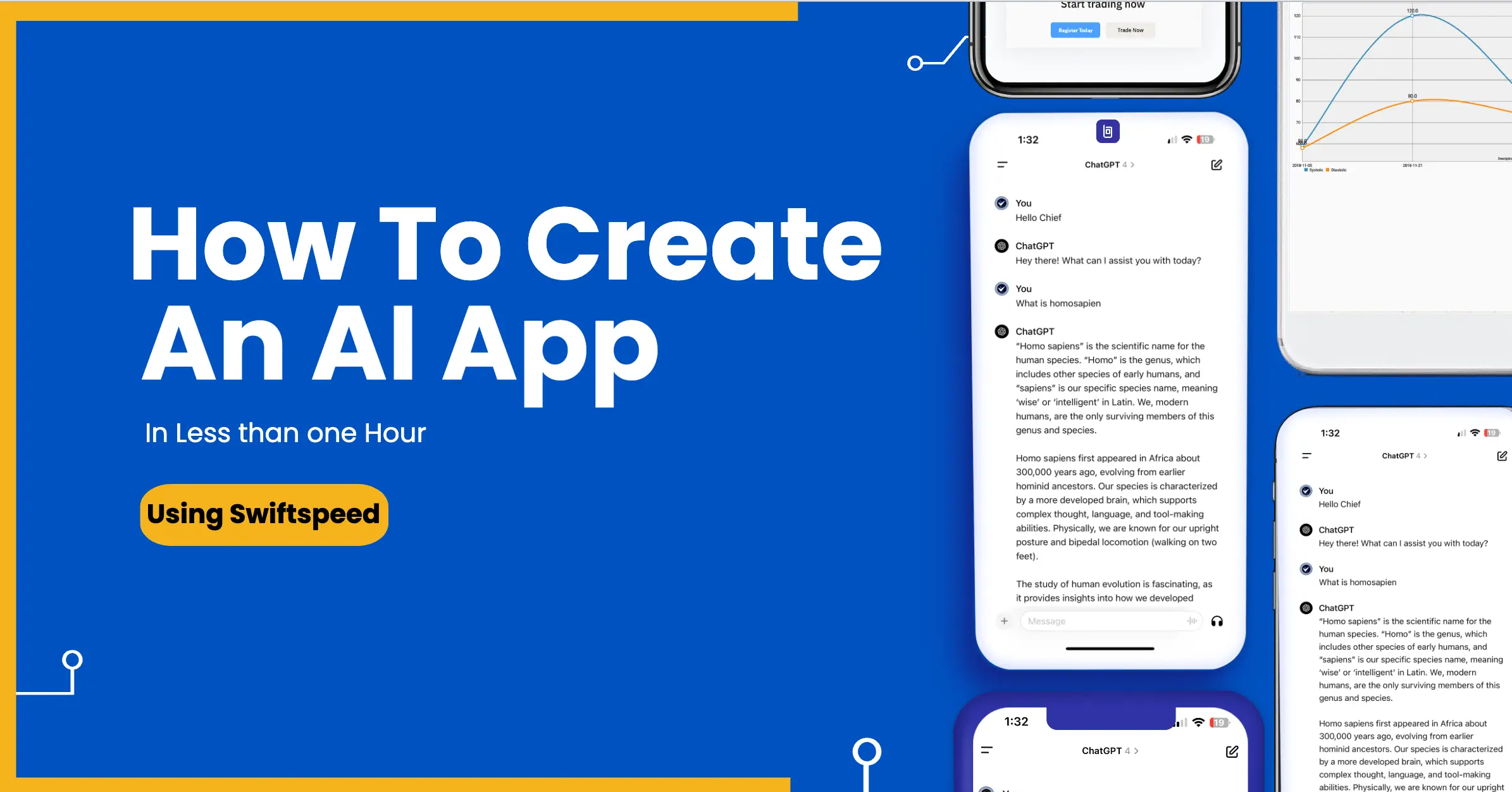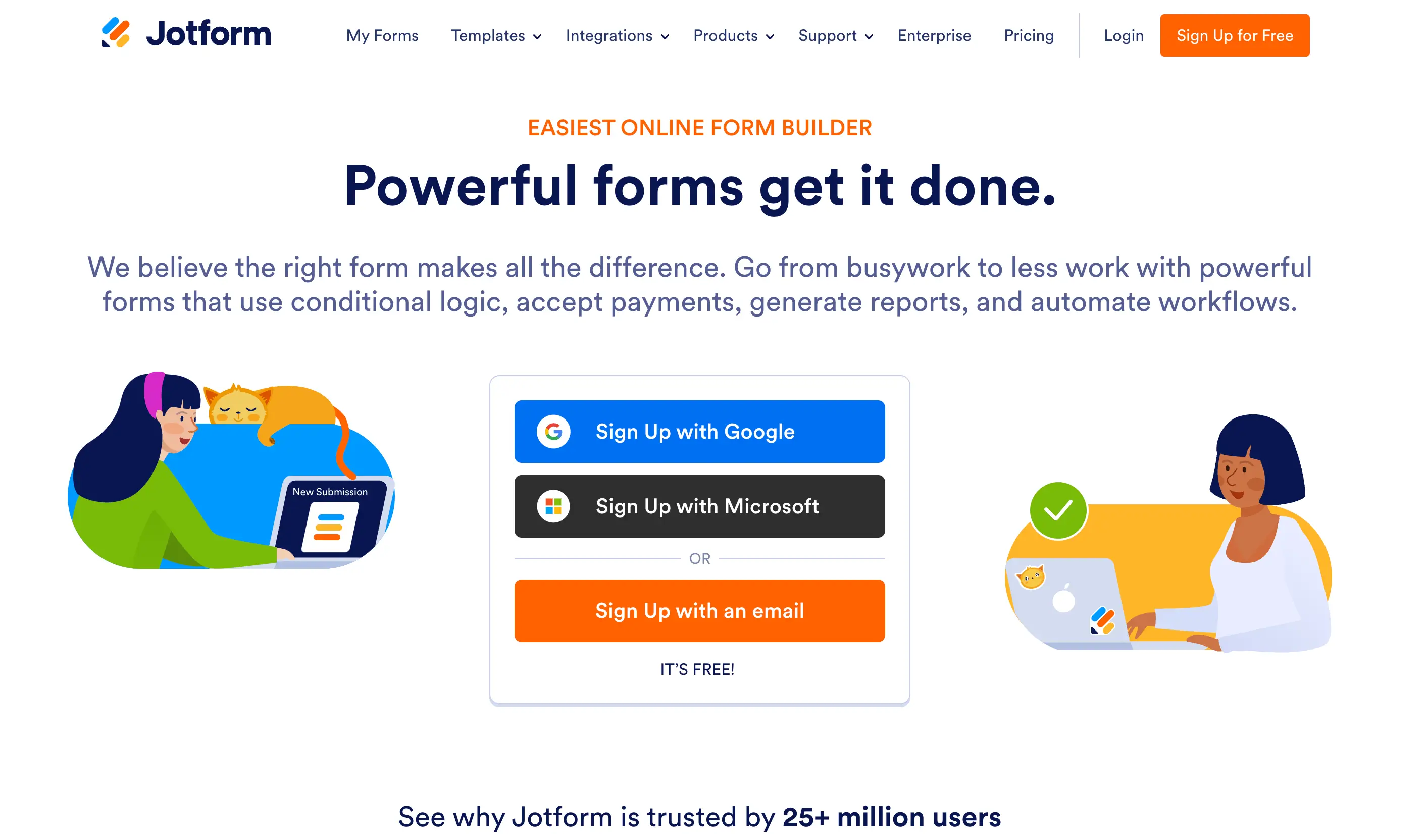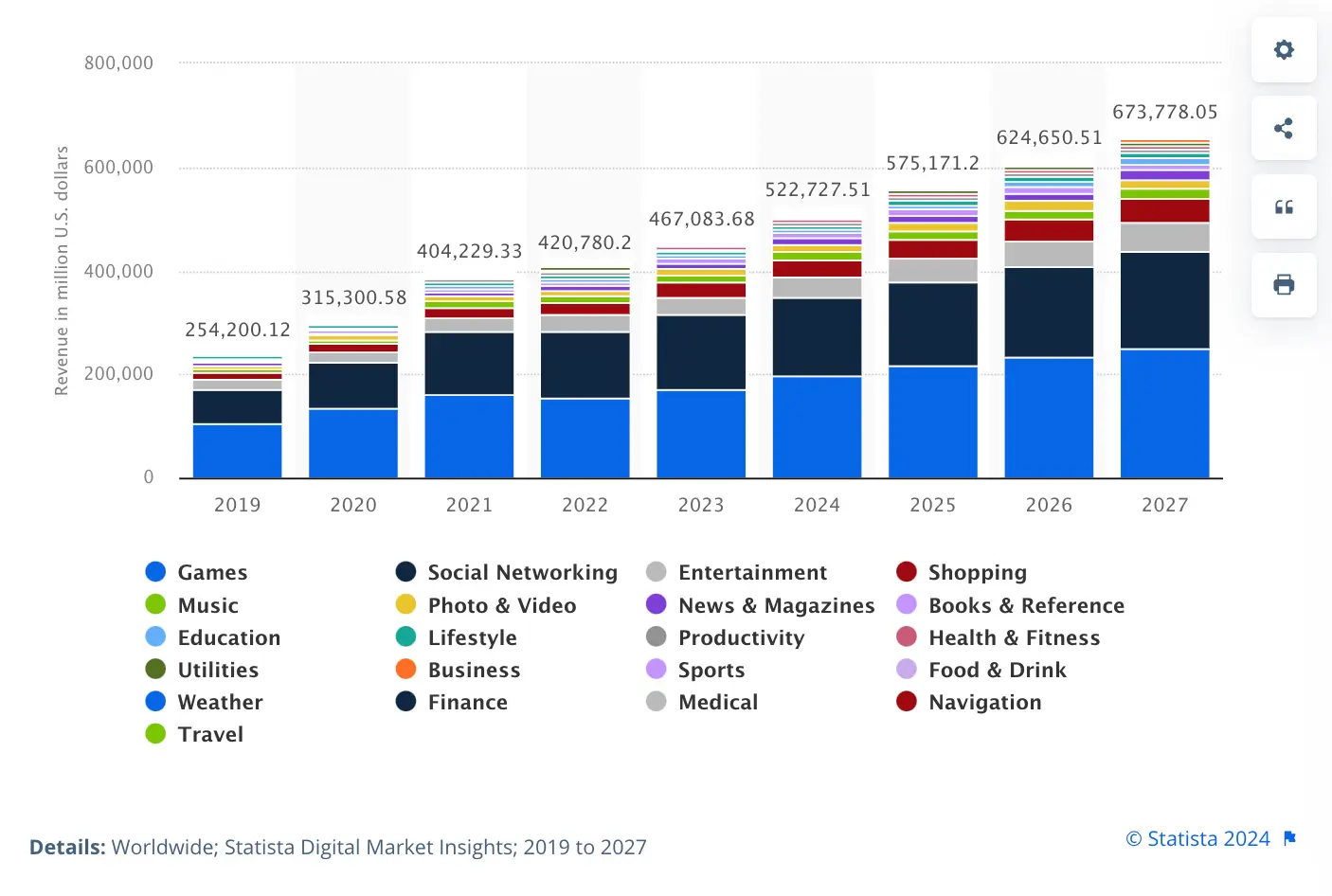No code development platforms have transformed how businesses and individuals create applications. These tools enable anyone to build functional web and mobile apps without writing a single line of code, using visual interfaces, drag-and-drop builders, and pre-built components instead of traditional programming.
Whether you’re a business professional automating workflows, an entrepreneur launching a startup, or a small business owner creating customer-facing apps, no-code platforms provide the tools you need to turn ideas into reality quickly and affordably.
👉🏾 Other Swiftspeed users have read: 80 Best Mobile App Ideas for Startups in 2024
What Are No-Code Development Platforms?
No-code platforms are software solutions that let you build complete applications using visual interfaces rather than code. Instead of learning programming languages, you work with intuitive drag-and-drop editors, pre-made templates, and customizable components to create everything from simple landing pages to complex business applications.
Key Benefits of No-Code Development
Speed: Build apps 10 times faster than traditional coding. What used to take months can now be completed in weeks or even days.
Cost Efficiency: Eliminate the need to hire expensive developers or development agencies. Reduce both upfront costs and ongoing maintenance expenses.
Accessibility: Empower non-technical team members to create their own solutions. Business users can build the tools they need without waiting for IT resources.
Flexibility: Most platforms offer options to add custom code when needed, scaling from pure no-code to low-code as requirements grow.
Cross-Platform Capability: Build once and deploy everywhere. Create applications that work on web browsers, iOS, Android, and desktop from a single project.
Common Use Cases
No-code platforms excel at various applications including:
- Internal business tools like CRM systems, project trackers, and dashboards
- Customer-facing apps such as e-commerce sites and service portals
- Workflow automation and process optimization
- Data integration and system connectivity
- Rapid prototyping and MVP development
- Mobile apps for both iOS and Android
The 12 Best No-Code Development Platforms
1. Swiftspeed App builder
Swiftspeed stands out as a comprehensive no-code AI app builder platform designed specifically for mobile and web app development. The platform combines powerful features with exceptional ease of use, making it ideal for businesses of all sizes.
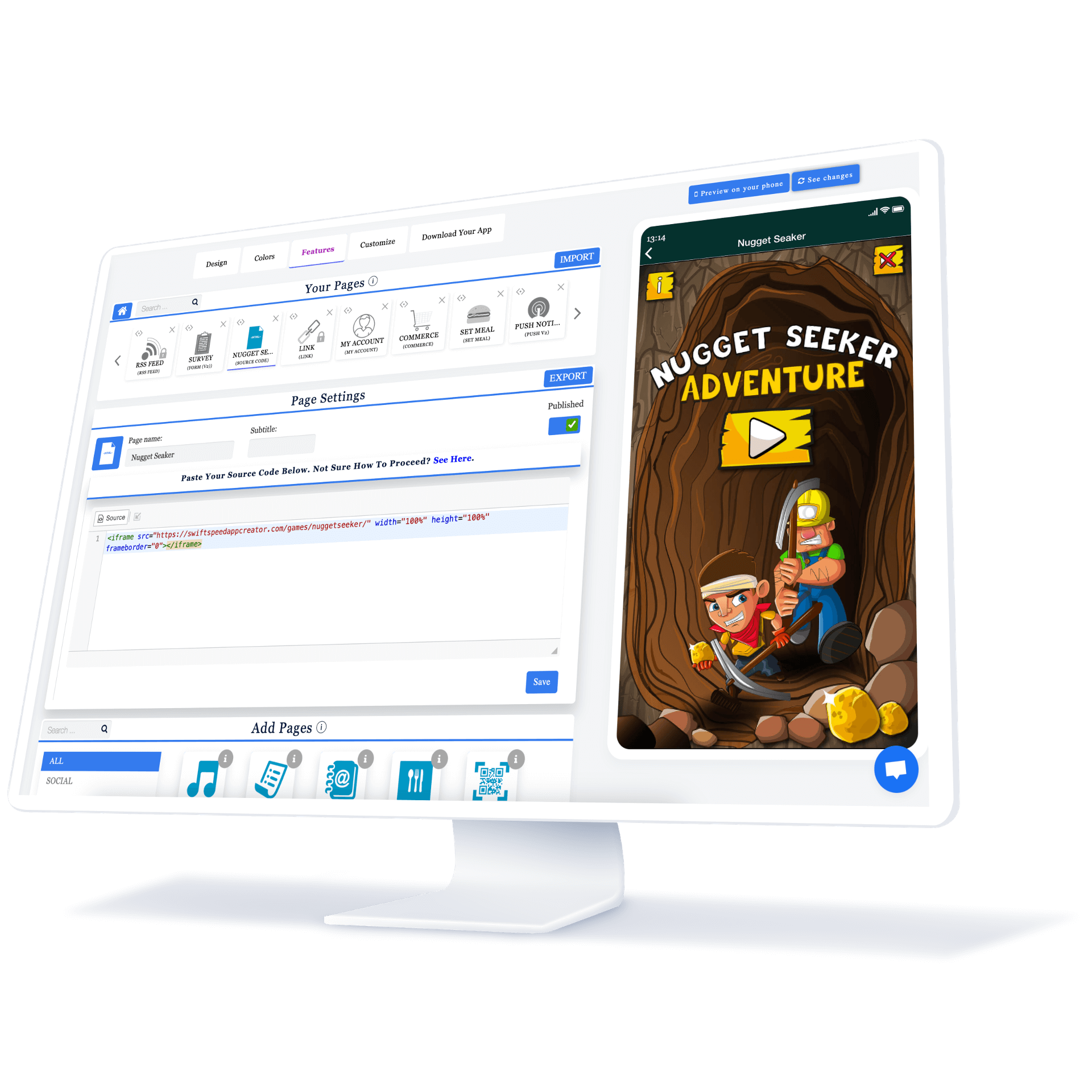
Key Features:
- Intuitive drag-and-drop interface for building professional apps
- Extensive library of pre-built templates and themes
- Seamless integration with third-party services including payment gateways, social media platforms, and analytics tools
- White-label app maker platform that lets you create your own branded no-code solution
- Custom payment gateway integration for your own users
- Complete user management system
Best For: Entrepreneurs and businesses wanting to build mobile apps quickly, or those looking to start their own app development service.
Pricing: Flexible monthly and annual subscription plans based on features, storage, and number of apps. Custom pricing available for enterprise needs.
Why Choose Swiftspeed: The white-label capability is a game changer. You can build an entire app development business without writing code, manage your own users, and integrate your payment systems for complete control.
2. Appian
Appian is an enterprise-grade low-code platform focused on business process management and complex application development. Founded in 1999, it has become a leader in helping large organizations build sophisticated applications.
Key Features:
- Visual designer with drag-and-drop interface
- Powerful business process management (BPM) tools
- Advanced case management capabilities
- Enterprise-level security and scalability
- Cloud-based SaaS deployment
- Integration with existing enterprise systems and data sources
Best For: Large enterprises needing complex business applications with robust process automation.
Pricing: Starts at $5,000 per month for the team edition supporting up to 5 applications. Custom enterprise pricing available.
Considerations: Steeper learning curve than simpler platforms, but the power and scalability make it worthwhile for enterprise use cases.
3. Builder.ai
Builder.ai offers an AI-powered approach to no-code development, making it exceptionally easy to create mobile and web applications through visual design.
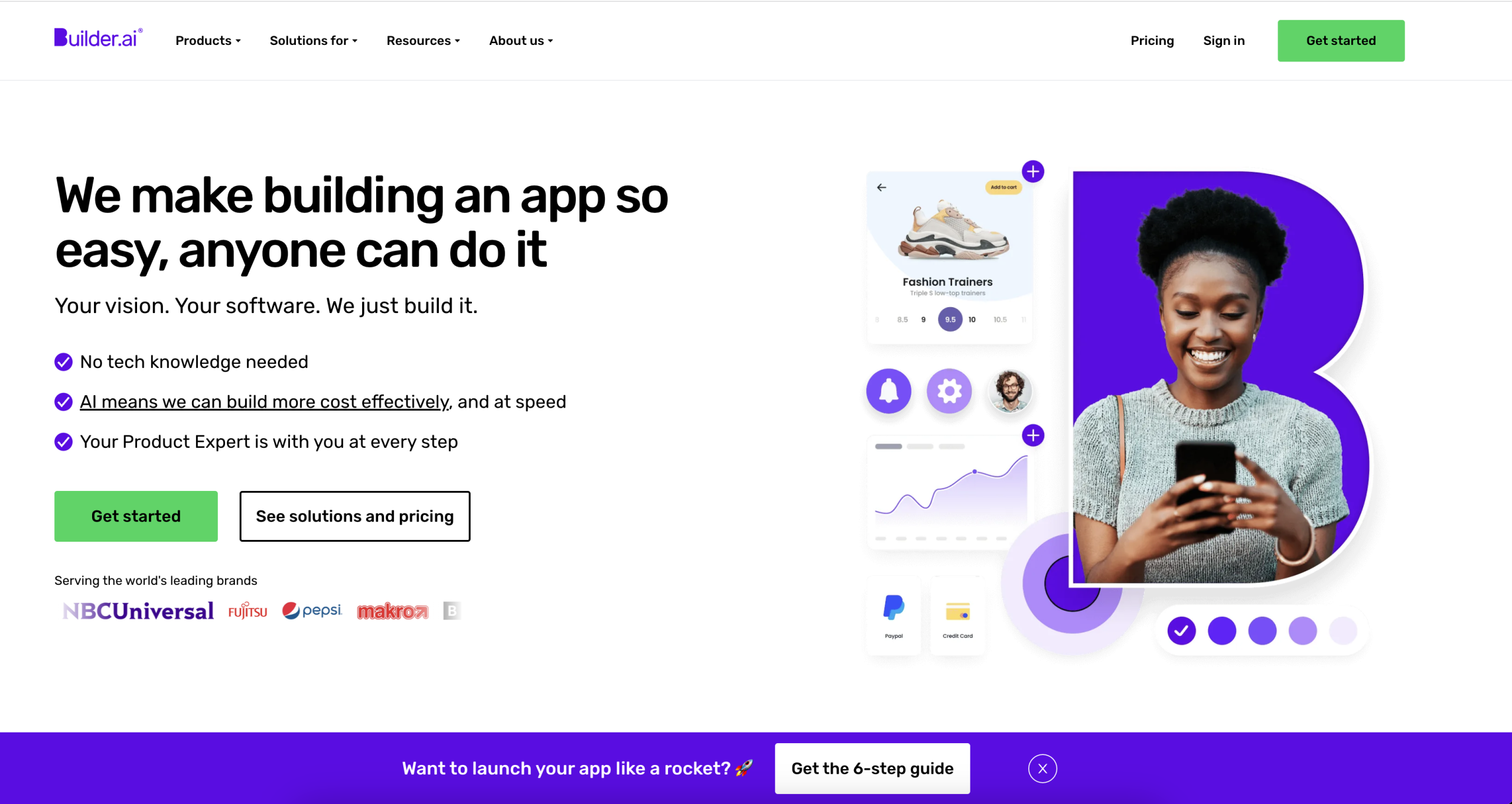
Key Features:
- Intelligent interface that guides you through app creation
- Visual drag-and-drop editor
- Pre-built templates and customizable components
- Professional design capabilities without coding knowledge
- Responsive customer support
Best For: Entrepreneurs and businesses wanting to quickly create professional applications with minimal learning curve.
Pricing: Free plan for basic usage, with premium plans offering advanced features and priority support.
4. Appy Pie
Appy Pie has established itself as a leading no-code platform with an extensive feature set and user-friendly approach.
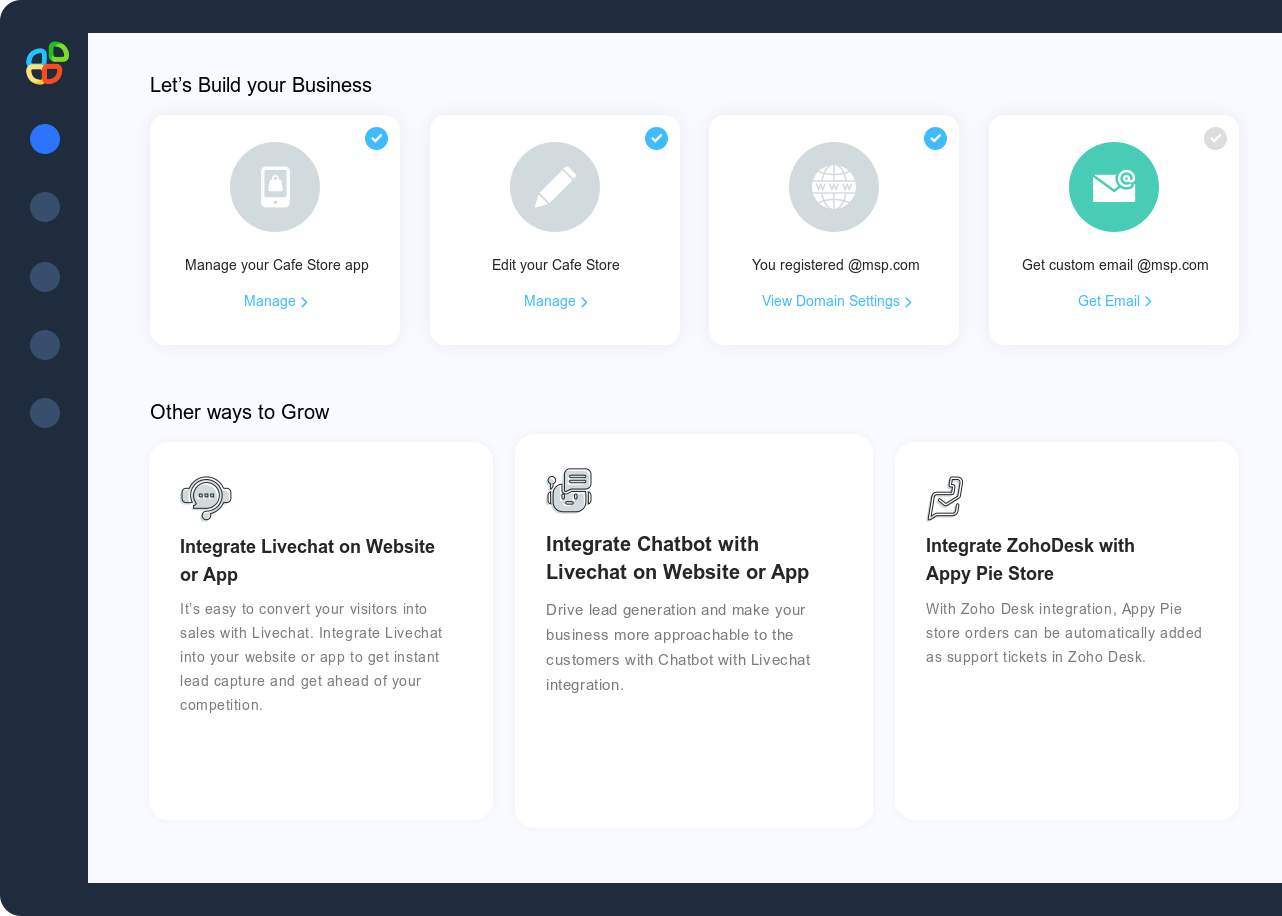
Key Features:
- Intuitive drag-and-drop interface
- Wide range of templates for various industries
- Pre-built components for quick integration
- Supports both simple websites and complex e-commerce apps
- Strong customer support with responsive service
Best For: Startups and small businesses needing versatile app development capabilities.
Pricing: Affordable basic plans starting at competitive rates, with higher-tier options for advanced features.
5. BuildFire
BuildFire provides a robust platform for creating mobile and web applications with professional results.
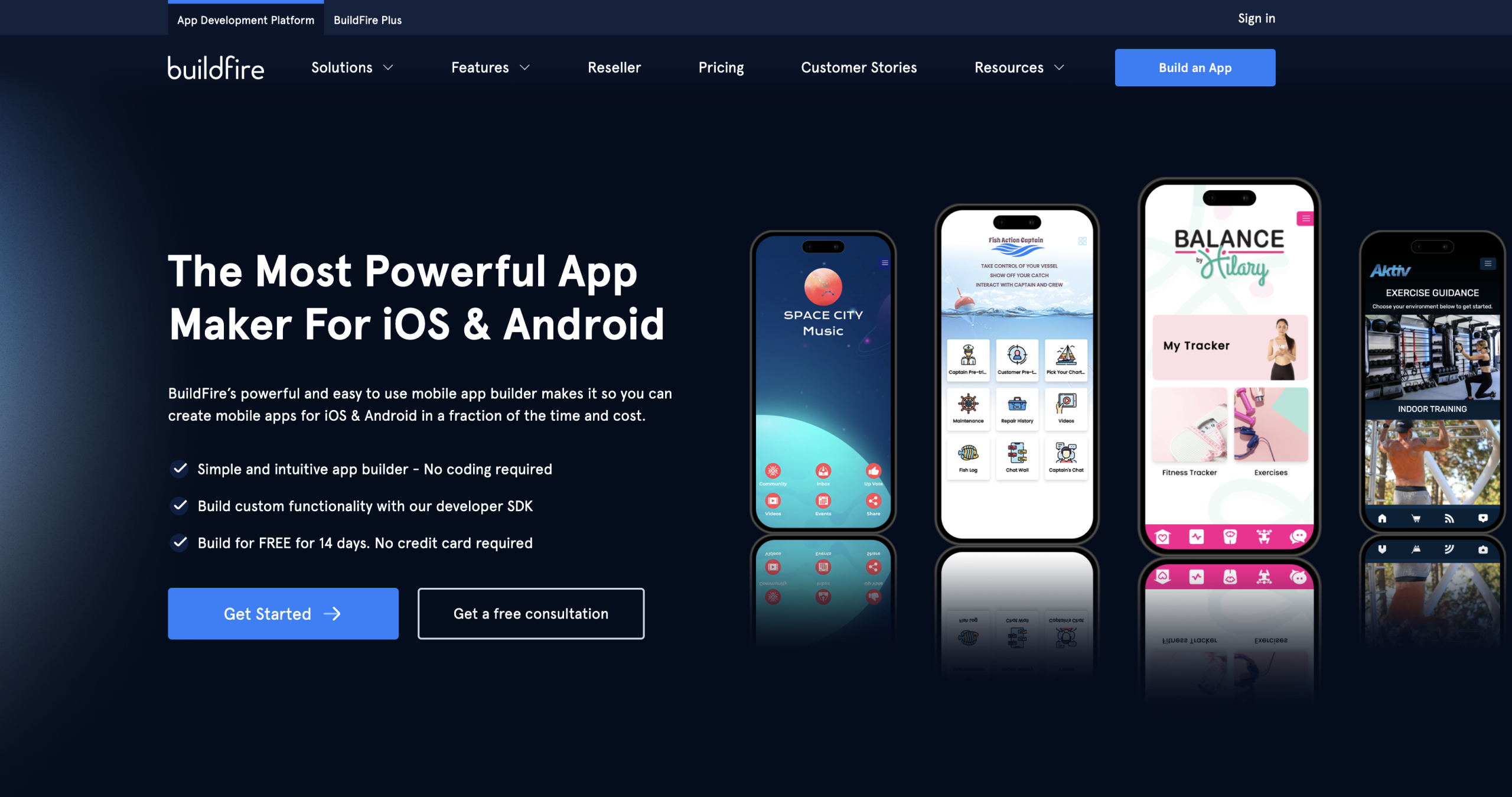
Key Features:
- User-friendly drag-and-drop interface
- Variety of pre-built templates and modules
- Custom branding options
- Push notifications and analytics
- Real-time updates and modifications
Best For: Business owners wanting to create professional mobile apps without technical expertise.
Pricing: Free plan with limited features. Paid plans start at $59 per month with additional features like custom branding and advanced analytics.
6. AppsGeyser
AppsGeyser specializes in mobile app creation with an extensive template library and straightforward development process.
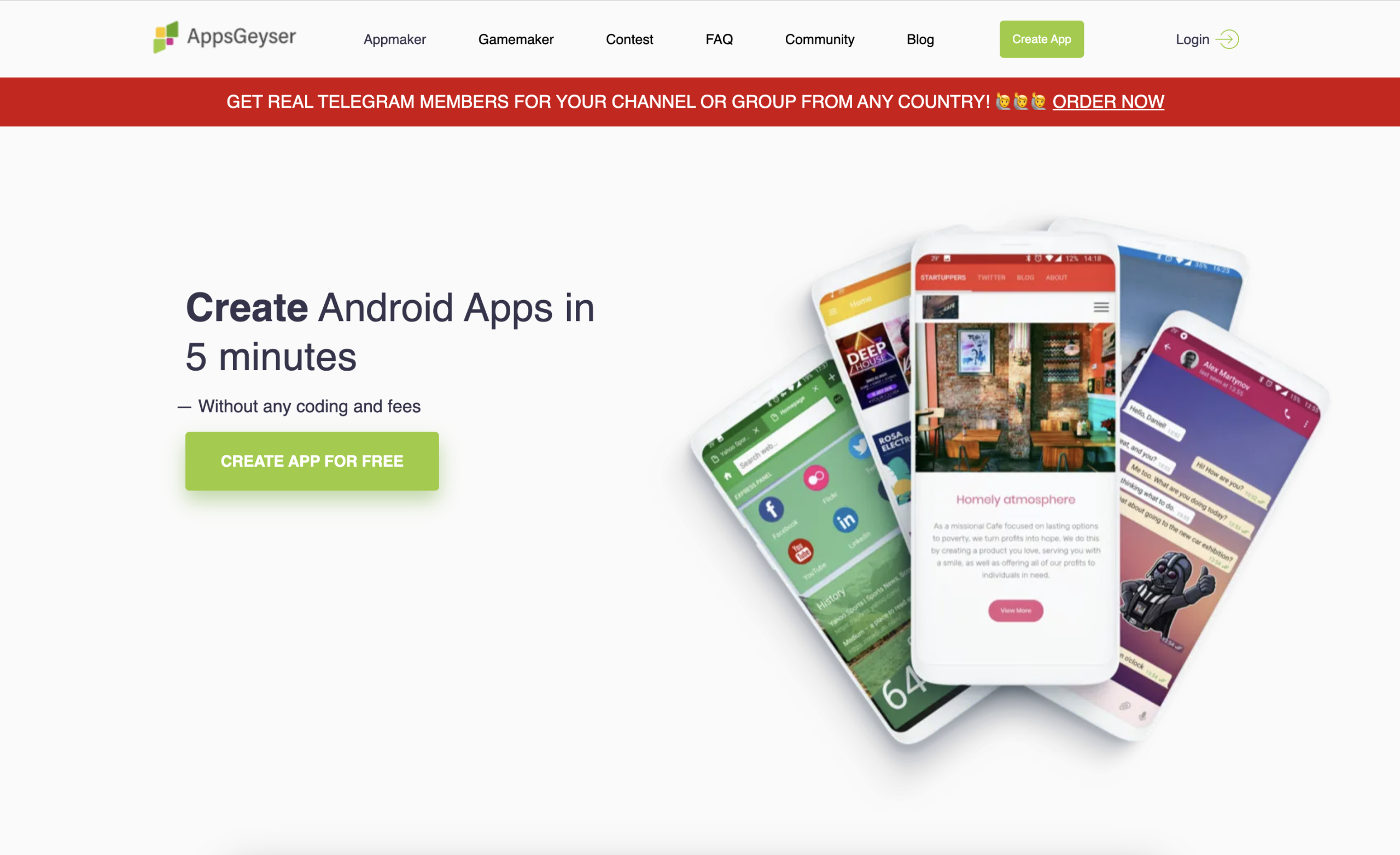
Key Features:
- Vast library of pre-designed templates
- Easy customization with drag-and-drop functionality
- Step-by-step guides for beginners
- Dedicated support team
- Monetization options for apps
Best For: Beginners wanting to create mobile apps quickly with minimal technical knowledge.
Pricing: Free plan for unlimited apps with basic features. Paid plans offer advanced features like ad-free apps, push notifications, and in-app purchases.
7. Siberian CMS
Siberian CMS offers powerful customization through its extensive module library, making it suitable for creating highly tailored applications.
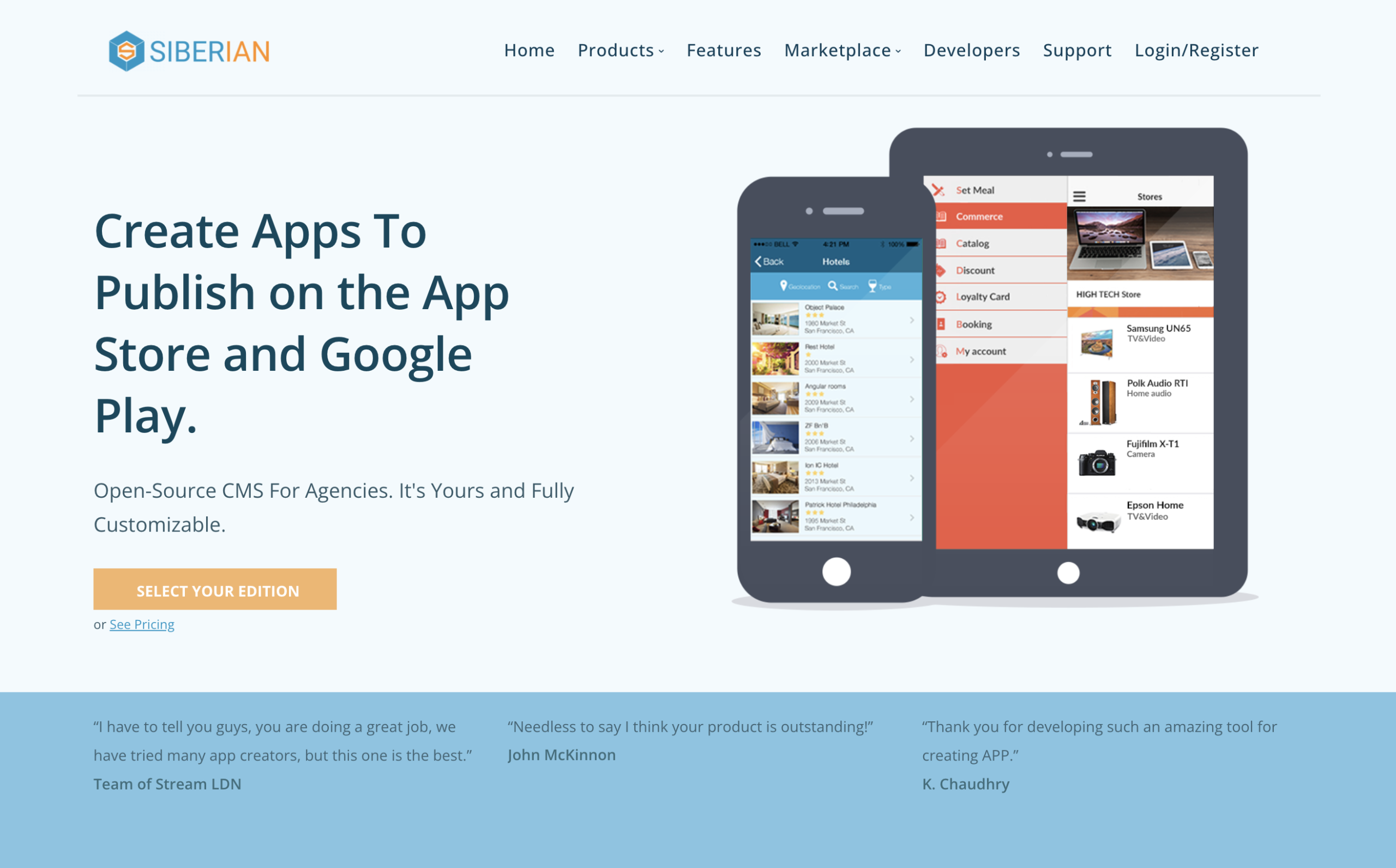
Key Features:
- Over 80 modules and extensions
- Intuitive drag-and-drop interface
- Wide range of templates and themes
- Flexible customization options
- Responsive customer support
Best For: Users needing extensive customization options and specific functionality.
Pricing: Monthly and yearly subscription options with free trial period. Flexible plans for various budgets.
8. WordPress
WordPress remains one of the most popular platforms for website development, with extensive plugin ecosystems enabling no-code app creation.

Key Features:
- Massive library of themes and plugins
- User-friendly interface for beginners
- Highly customizable with thousands of options
- Strong security and regular updates
- Large community for support and resources
- Both free and premium options
Best For: Website development and content-focused applications.
Pricing: Free basic plan with premium plans offering advanced features at affordable rates.
Note: While primarily a website platform, WordPress can be extended to create mobile apps through various plugins and services.
9. Betty Blocks
Betty Blocks has quickly gained popularity since its 2015 launch, offering a powerful visual editor with extensive built-in capabilities.
Key Features:
- Intuitive drag-and-drop interface
- Pre-built templates and components
- Database and API integrations
- Real-time collaboration tools
- Form builders and workflow automation
- Single platform for web, mobile, and internal apps
Best For: Teams wanting to build everything from simple to complex enterprise applications.
Pricing:
- Starter: $199/month (1 app, 3 users)
- Pro: $499/month (10 apps, 10 users)
- Enterprise: Custom pricing
Considerations: Smaller user base as a newer platform, but strong community support and scalability.
10. AppSheet (Google Cloud)
AppSheet was acquired by Google Cloud in 2020, bringing powerful no-code capabilities with deep Google integration.
Key Features:
- Visual app builder interface
- Connects to Google Sheets, MySQL, Salesforce, and more
- Auto-generates native mobile apps for iOS and Android
- Offline functionality with data syncing
- Role-based access control
- Enterprise-grade security
- Integration with Google Workspace tools
Best For: Businesses already using Google Cloud or Google Workspace, or those needing simple CRUD apps and mobile workflows.
Pricing:
- Free: 1 app with limited features
- Basic: $5/user/month
- Pro: $10/user/month
- Enterprise: Custom pricing
11. Quickbase
Quickbase has been a trusted platform since 1999, offering robust capabilities for custom business applications.
Key Features:
- Visual drag-and-drop builder
- Connects to 100+ data sources
- Workflow automation tools
- Real-time notifications and alerts
- Role-based access control
- API integrations
- Mobile support for iOS and Android
Best For: Established businesses needing customized applications with strong data integration.
Pricing: Starts at $15/user/month for basic plans, up to $49/user/month for premium features. Custom enterprise pricing available.
Considerations: Steeper learning curve but powerful for complex business needs.
12. Caspio
Caspio specializes in cloud-based web database applications and business solutions without coding.
Key Features:
- Visual form and workflow designer
- Data connectors for various sources
- Web and mobile app support
- User management and permissions
- Automatic database creation
- APIs and webhooks
- Managed hosting and automated backups
Best For: Building web database applications, forms, and workflows quickly.
Pricing: Basic plan starts at $19/month with enterprise pricing customized to needs.
Ideal Use: No-code developers wanting to build custom database solutions faster.
How to Choose the Right No-Code Platform
Selecting the best platform requires careful evaluation of your specific needs. Here’s a practical framework for making the right choice.
Essential Selection Criteria
Ease of Use: Look for intuitive drag-and-drop interfaces with minimal learning curve. Check for built-in templates, workflow automation, and helpful documentation.
Customization Flexibility: Determine how much control you need over design and functionality. Some platforms excel at basic apps while others support complex custom logic.
Integration Capabilities: Identify which third-party services, databases, and APIs you need to connect. Ensure the platform supports your required integrations.
Scalability: Choose a platform that can grow with your business. Consider cloud infrastructure, deployment options, and capacity for increased users and data.
Security and Compliance: Verify robust data security, user management, access controls, and compliance with relevant standards for your industry.
Mobile Support: If you need mobile apps, confirm native iOS and Android support, offline functionality, and responsive design capabilities.
Pricing Structure: Understand total costs including user licenses, storage, features, and support. Calculate expenses as your needs scale.
Critical Questions to Ask
Before committing to a platform, answer these questions:
- What types of applications do you need to build?
- Who will be building the apps (technical level)?
- What third-party integrations are essential?
- Do you need mobile, web, or both?
- What level of customization is required?
- How many users will access your applications?
- What security and compliance requirements must be met?
- What is your budget for initial development and ongoing costs?
- What support options are available?
- Can you test the platform with a free trial?
Making Your Decision
Start by shortlisting 3-4 platforms that match your basic requirements. Take advantage of free trials to get hands-on experience. Build a simple prototype of your intended application on each platform to compare:
- Development speed and ease
- Available features and limitations
- User interface quality
- Documentation and support quality
- Total cost projection
This practical evaluation will reveal which platform best fits your workflow and requirements.
Getting Started with No-Code Development
The barrier to entry has never been lower. Most platforms offer free trials or freemium plans, allowing you to experiment without financial commitment.
Start with a simple project. Build something small but useful to learn the platform’s capabilities and limitations. As you gain confidence, tackle more complex applications.
Join platform-specific communities, forums, and user groups. The collective knowledge and shared templates from other users can dramatically accelerate your learning and development.
Remember that no-code doesn’t mean no planning. Successful applications still require clear requirements, thoughtful design, and proper testing. The difference is you can now focus on solving business problems rather than wrestling with code syntax.
Finally
No-code development platforms have democratized application creation, enabling anyone with an idea to build functional, professional software. From simple mobile apps to complex enterprise systems, these tools provide the capabilities once reserved for professional developers.
The platforms reviewed here each offer unique strengths. Swiftspeed excels at mobile apps and white-label solutions, Appian handles enterprise complexity, AppSheet integrates perfectly with Google Workspace, and options like Appy Pie and BuildFire provide accessible starting points for beginners.
Your choice depends on your specific needs, budget, technical comfort level, and growth plans. Start with the selection criteria outlined above, test multiple platforms, and choose the one that best aligns with your goals.
The no-code revolution is here, and it’s transforming how we build software. With the right platform, you can turn your ideas into functioning applications faster than ever before, without writing a single line of code.

